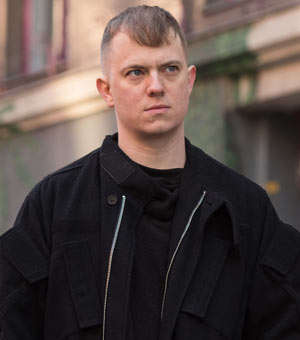The Art of Deception: Lazlo Pearlman & Fake Orgasm
by Travis Jeppesen on October 30, 2011
It’s like Deleuze and Guattari put it in the opening pages of Anti-Oedipus – it eats, it shits, it fucks, it’s everywhere – you can’t avoid it, and yet you’re taught to both embrace and avoid it. They were talking about desire, but I mean to talk about something else entirely. Definitionality. The ways that language confines us into being certain things. The angsty energy behind every act, every gesture, that is a refutation of the ever-scary not-knowing that we all are, at a certain point, unable to own up to.
A new film by Jo Sol, Fake Orgasm, serves as a portrait of Lazlo Pearlman, body and performance artist. When I say “portrait,” I mean it in the classic, painterly sense – that is, somewhere between truth and fiction. You can’t call it a mockumentary, as a mockumentary is a form that, while blurring the lines between truth and fiction, ultimately does it towards a final end – to poke fun at the documentary medium, and, by extension, every audience’s questing for truth whenever they enter the cinema scenario. No, this Fake Orgasm is something else entirely – a truth posing as a lie, a lie that is true to most.
I haven’t seen any of Jo Sol’s previous films, but according to Lazlo, who I’ve had the pleasure of speaking to on at least two occasions, he has the reputation of being something of an anarchist in the world of Spanish cinema. Lazlo credits Sol with bringing him round to anarchism during the making of Fake Orgasm – which, in the end, very much turned out to be a collaborative effort between the director and the artist. Just as in Deleuze and Guattari’s work, it is probably impossible to determine whose contribution is whose; and of course, this refutation of ownership is very much in line with anarchist tradition.
Spoiler alert. Fake Orgasm is ultimately a meditation on passing, and as such, is structured as a revelation of layered truths; an onion: you can never get to the core, there is none. The truth is in the layers. Lazlo is in a Barcelona nightclub, a charming American dude hosting a “fake orgasm” contest for a hetero crowd in their 20s and 30s. Feels so risky and outré for them, getting up on stage and feigning climax into a microphone – who will fake it best? The evening is divided into three parts: first, the women; a break; then, the men. What will be the third part? The announcement of a winner? Now it’s time for the host to present himself as the biggest “faker” of all. Sultry music comes on, he does a slow striptease, the audience is mildly amused, what’s going on here anyway? Lazlo turns around, faces his audience, completely naked. The music stops. There is total silence. An unnerving silence. He exits the stage. The silence endures; no applause. He has a cunt. Omigod. He wins.
After the silence sparked by this revelation, the audience is taken into another room, where they find Lazlo, naked and covered in white paint, perched naked on a bed. They are allowed to circle the bed, interrogator-style, and ask him any question they want. They ask all the wrong questions, questions that you would normally not ask a human being. It’s okay in this situation; “he,” this thing, has deceived them. He is no longer worthy of the moniker human, so we can ask him/her/it anything we want. Are you happy being…that way? Don’t you want a dick? What do you date, men or women? Clearly there is something wrong with him. Her. It.
Certain questions don’t deserve an answer. If anything, Lazlo can at least teach them this. When asked which gender he is attracted to, he responds, “Why do you want to know? Do you want to date me?” When asked if he is happy, he quips, “Yes. I have reached nirvana.”
Eventually Lazlo gets a job in a sex club, doing his striptease thing. He thinks that the only way to teach people is by challenging, confronting them. And it works, for a while. Until the day when he suddenly becomes The Man With The Pussy, a freak show phenomenon. And he realizes this onstage – it is no longer a surprise, a confrontation, because word has spread and the people have come knowing exactly what they are about to see. They have been told ahead of time. They are just there to confirm it, to make sure it is possible, to see that it is true.
Lazlo always leaves. He admits this in the film. The only way for him to survive is to pursue a constant line of flight. This puts him very much in league with a whole tradition of artists and visionaries whose bodies always had difficult relationships with place, whose bodies became a sort of moving landscape, individuals for whom a refutation of stasis was an intrinsic part of the whole project of becoming. You’re not running away from the truth; you’re running away from other people’s versions of truth that threaten to imprison the self between parenthetical brackets. Lazlo’s dowry is his ability to evade the prison of definitionality. His body, then, is for him a convenient metaphor, a tool he can work with in forging that pathway out of a scenario he himself has created.
Elsewhere in the film, Lazlo spends some time with fellow Barcelona expat Lydia Lunch, who suggests that orgasm is boring. Why, she asks, do we place so much importance on this thing, this momentary release? So fleeting! And maybe half the time, faked!
She’s right. And I believe this can be taken even further. Sex is boring. Dicks are boring, pussies are boring. Gender is, at best, insignificant, or at least should be. Isn’t that what we’re all working towards, some of us at a faster rate than others? Maybe it isn’t all that radical to take a step back and consider the possibility that all those things we believe to be so goddamn important are, in fact, boring. That doesn’t mean we should stop having sex and orgasms, but we should recognize that the categories that currently mold our perception of human beings are worthless and should be set on fire. Until that happens, the living work of Lazlo Pearlman suggests, we’ll be faking it to the grave.


3 comments
Fantastic article.
I actually saw one of Lazlo’s performances, where the audience had no idea whatsoever what they were about to witness. The reactions were telling. And mostly made me sad. But then I tell myself that as long as there are people like Lazlo around to put up a sort of mirror in which we must view ourselves, eventually some of us will also open our eyes and see.
by Tsipi on October 31, 2011 at 10:57 am. #
I also attended one of Lazlo’s performances. Maybe even the same as Tsipi mentions on her comment.
I was taken breathless from the beauty in his honesty. This was the most courageous performance I had ever seen, and I felt a deep belonging and true presence in the sense, that this was a present for me to see: no lies, no cheating, just the plain truth: A naked person inviting us to dance with him. That was really all: dance with me, to the end of love.
I have given much thought to lies and truth since, quiestioning whether destinction between lies and truth is really important and to whom? Because what is the truth: When I look at you, and you look at me, who am I then? Am I the same as I would be, had you not looked at me? Can I transform you by looking at you or must you wish to be transformed to make it happen in reality? Is reality just real while we look at it, what is it when we close our eyes?
What do we see other than we want to see? Does this make it true? Or false?
by Lisbeth Barkhuus on November 2, 2011 at 5:28 pm. #
sorry , realy for me is art , is complicate but dhe film is inside of dhe concep mediterraneo for understen and talk ,dhe la realidad de el control social of dhe bodys in people, who is dhe fuck reality ….. your reality whit noting question ?? or dhe people who reflexion and have plaesure of chance in dhe life ….???
de verdad siento no poder escribiros perfecto ingles ,pero esta pelicula esta enfocada par el publico español y latino , creando en los heteronormatibos un colapso mental muy muy inyteresante y estoy orguyosisima de aver colaborado con lazlo con activista performatica independiente española ….. lazlo ya te vere y hablaremos te quiero
veronika arauzo
by VERONIKA ARAUZO on November 4, 2011 at 5:15 pm. #